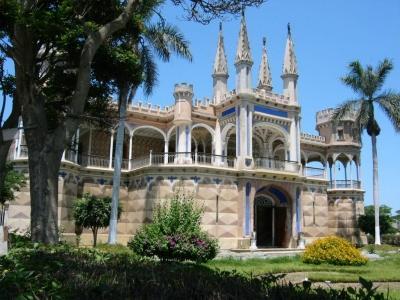Cañete, Lima, Peru
Suggest Place to Visit
1193
Track to location with GPS |
 |
The old Cañete Valley, with an agricultural preponderance and a benign climate, was known by the name of “Valle de Guarco”, a word of Quechua etymology that translated into Spanish means: “to hang, hang or place of the hanged man”. It is said that it was so called, because its primitive inhabitants had the custom of subjecting their enemies and rebellious tribes to this form of punishment.
The denomination of "Valle de Guarco" lasted until the arrival of the Spanish and when a group of these in 1533 was in the Temple of Pachacamac, they collected part of the treasures for the rescue of Atahualpa, they had the first information about the existence of the important valley, interested in knowing its geographical environments and the fertility of the area.
Subsequently, Don Francisco Pizarro founded the city of Lima, on January 18, 1535. Since then, when 21 years had passed, a greater interest arose among the Spanish to reach the unknown “Valle de Guarco”, complementing this decision with the desire and will of the viceroy Don Andrés Hurtado de Mendoza, to found a new town south of Lima. For this purpose, a commission previously carried out the verification and feasibility, setting the appropriate and strategic place near the sea in the "Coaldas" sector, in the vicinity of what is now the "Santa Bárbara" farm.
Once all the preparations were made, Captain Don Jerónimo de Zurbano and his entourage in compliance with the viceroy's mandate moved to the place and in a solemn ceremony carried out the Spanish foundation of the “Villa Santa María de Cañete” on August 30, 1556. Its founders They put this name in honor and memory of the town of Cañete, a city located in Cuenca, Spain; place of origin of the then viceroy Andrés Hurtado de Mendoza. Due to this momentous event, the old territory of the "Guarco Valley" was given the name of Cañete.
In colonial and republican times, Cañete was the place of residence for several groups of foreign immigrants, who landed at the ports of Cerro Azul and Santa Bárbara, such as African, Chinese, Japanese, and Italian slaves, among others.
This province was recognized in 1992 as the Cradle and Capital of Peruvian Black Art, by the Ministry of Industry, Foreign Trade, Tourism and Integration.
Its capital is the city of San Vicente de Cañete and one of the most interesting towns is Lunahuaná, which has recently become a tourist place due to the popularity of canoeing and other adventure sports that can be practiced in that town.
Cañete is a tourist place due to its climate, the flow of its river, its culinary art and because it is the enclave of Afro-Peruvian culture, a culture basically centered in the district of San Luis de Cañete. In 1971 the city of San Vicente de Cañete held the first Afro-Peruvian Folklore Festival: the Black Art Festival.
This valley has agriculture as the basic activity of its economy. More than 60% of its production is dedicated to the cultivation of cotton, and lately the production of fruits has also been highlighted, among them grapes and mandarins.
Currently the Cañete Valley is also distinguished for being a producer of grape-based liquors, including pisco, wine and cachina. Its typical dishes include dry soup, Carapulcra (with dried potatoes), dried raya Charquicán, and Beans with tuca (of black origin).
Comments
We don´t have yet any comments about:
Cañete, Cradle and Capital of Peruvian Black Art
Cañete, Cradle and Capital of Peruvian Black Art
Be the first to leave a comment as it is very important to inform other people
Outros locais a visitar
Within a radius of 20 km from:Cañete, Cradle and Capital of Peruvian Black Art
Unfortunately we do not have information on other places to visit in this area yet
Hotel reservation near Cañete, Cradle and Capital of Peruvian Black Art within a radius of 20 km
Why to book with BOOK HOTEL LISBOA
The best prices
Our partnerships with the world´s largest operators offer research on the best market prices.
More options
At Rotas Turisticos you can book the hotel, buy the air ticket, book the transfer from the airport to the hotel and vice versa, book the local excursions, rent the car, take travel insurance and consult the places to visit and where to go.
Holiday Tips & Destinations
Hundreds of holiday destinations with all the options that allow you to easily choose the destination that best suits your dream vacation.
BOOK HOTEL LISBOA
Links






